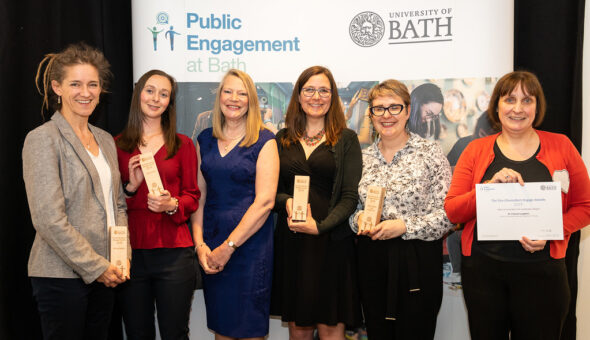Over the last 10 years of the Vice-Chancellor's Engage Awards we at the Public Engagement Unit have read through lots of award nomination forms. So what makes a good nomination? We thought we'd pull together some of our top tips to share some of our insights.
The Vice-Chancellor's Engage Awards 2023 are currently open for nominations. Nominations will be judged by a panel of colleagues from across the three Faculties and School alongside a public engagement professional from another HEI and a representative from a community organisation. Our role in the process is to support the panel. One of the ways we do that is carrying out an initial sift of all nominations. So, if you're thinking of submitting to the Awards, check out our list of do's and don'ts to what we think makes a strong nomination.
Do
- Put supporting evidence in your application - the judging panel can only review material that is included in the application form. If you have evidence from your evaluation that would strengthen your nomination, make sure you include it in the application.
- Showcase the outcomes of your work - what has changed as a result of your project, and how do you know this? Be clear about what the outcomes are and how you evaluated them.
- Include testimony from your project partners and public groups - quotes from project partners and public groups are a great way of showing the impact of your work and why it matters to the people involved. A quote can also help flesh out the narrative of your project and complements your evaluation data.
- Think carefully about which category you apply for - there are five possible categories for the Engage Awards, and each has slightly different criteria. A good application for the Local and Civic Engagement category might look quite different to a good application for the Informing category. If you're not sure what category is best, contact the Public Engagement Unit for advice.
- Write in plain English for a non-specialist audience - make sure that your nomination is as easy as possible for the judging panel to read and understand. The judging panel consists of people from across the University and beyond, so don't assume they know your subject area and avoid jargon where possible.
Don't
- Forget to tell us what YOU have done - even when applying as a research centre or group, it's important for the judging panel to understand how each member has contributed to the project.
- Focus on work you haven't done - the Engage Awards recognise projects that can demonstrate and evidence their outcomes and successes. You may have lots of exciting plans for future work, but don't focus on this, as you can't be awarded for something you haven't done yet.
- Cram in as much as you can - the best nominations focus on one specific project and give detailed and well-evidenced examples to show why this project was successful. It's fine to mention other work you have done, but only if it's relevant and doesn't take away from the main project. The only exception is the Leadership category which focuses on work done over a 24 month period.
- Nominate someone without speaking to them first - we prefer self-nominations for the Engage Awards because it can be hard to provide evidence for work you haven't done yourself. However, if you are going to nominate a colleague, make sure you speak to them first! This can help you gather the evidence you need to make a strong nomination and makes sure the nominee is aware that they are being nominated.
- Forget to talk to the Public Engagement Unit - We are on hand to help you think through your nomination and give feedback on a draft nomination form. Get in touch at public-engagement@bath.ac.uk to book in a meeting with a member of our team.
We hope these tips will help you putting together your nominations for the Vice-Chancellor's Engage Awards 2023. The deadline for nominations is Friday 12 May, 5pm.
Rob Cooper is a Public Engagement Officer at the University of Bath
Respond



